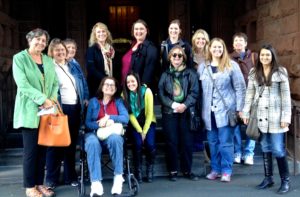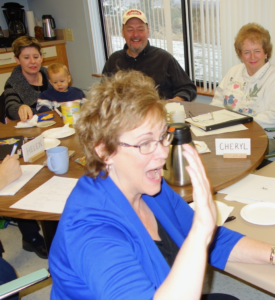 Foundation and Philosophy Develops
Foundation and Philosophy Develops
In the year 2000, Dr. Cindy Busch, a Speech Language Pathologist with a passion for studying clinical approaches to aphasia, began working with the Minnesota Stroke Association (MSA) to form an aphasia conversation group. This group provided services based on the social model of aphasia intervention, supported communication strategies, and life participation approaches to aphasia. Her passion for teaching also led to developing a relationship with the Minnesota State University Mankato Communication Disorders graduate student program. This allowed graduate students to learn about and then provide these cutting edge clinical approaches with aphasia group participants.
For the next 13 years the MSA aphasia program continued to evolve and developed into six groups that were quite successful in attracting people with aphasia in the Twin Cities. Student involvement expanded to include two other university graduate programs. An estimated 500 students had been trained in these techniques through the groups over the years.
MnCAN is Formed
In December 2013, Minnesota Connect Aphasia Now (MnCAN) was born as a new non-profit organization to continue the groups and provide the foundation for further growth and development in the area of services for people with aphasia. It was formed by Dr. Busch and a small group of speech pathologists and volunteers, with speech pathologist, Julia Halvorson as the founding executive director. Julia went on to lead the organization for the next nine years, increasing the outreach and development of a diverse variety of programming for people with aphasia and primary progressive aphasia (PPA). Julia announced her retirement in October of 2022.

MnCAN provides a variety of programs and services for people with aphasia and their care partners. MnCAN actively promotes strong, collaborative partnership with local communities. Through these partnerships, MnCAN has obtained donated meeting spaces, built awareness of the aphasia community, and established a referral network. Many groups are also offered virtually to accommodate transportation challenges and in order to reach people in varying locations and outstate areas of outreach.
Current research and evidence-based practices form the basis of all offerings from MnCAN. The primary tenets for this vital work include:
- Life Participation Approach to Aphasia (LPAA Project Group: Chapey, J. F. Duchan, R. Elman, L. Garcia, A. Kagan, J. Lyon, and N. Simmons-Mackie (2000))
- Supported Conversation Strategies for Aphasia (Kagan, Black, Simmons-Mackie, Square, 2001)
- Use of Social Wellness Model vs. Medical Model (Lyons, 2000; Simmons-Mackie, 2000,2007)
Certified and licensed speech pathologists (trained in the three tenets), MnCAN board members, volunteers and student interns, and staff, deliver and/or provide oversight for all programs. Of course, it is easier and more “normal” to communicate with words, but having aphasia, by definition, makes using words and sentences more difficult. So, we use “whatever works”! We also encourage verbal communication whenever possible and the expansion of verbal skills. As participants gain confidence, they are encouraged to develop personal and communication goals that lead to increased participation in their lives.
MnCAN is the only non-profit program in Minnesota that offers ongoing group-based programs and services to people specifically with aphasia and their care partners.
MnCAN continues to grow!
A timeline of MnCAN growth:
2018 – MnCAN added a monthly support group for care partners and an education and support group program for persons with primary progressive aphasia, facilitated by speech language pathologists.
2019 – MnCAN began a young adult support group to address the needs of younger people who are aphasia survivors. To further meet needs and provide even more diverse opportunities for people with aphasia, a Toastmasters International-based Gavel Club, Drama Club, and Coffee Chat group were added to the programming. The Gavel Club and Drama group were developed with participants who have aphasia and former experience in these areas – it was an opportunity for MnCAN to support their leadership and assistance in program development.
2020 – A One-to-One Communication Partner program was developed to meet the needs of those who would benefit more from individual, activity based programming and is facilitated via Zoom by trained volunteers. MnCAN began to offer virtual group options to meet the needs of the community.
2021 – MnCAN was able to expand its staff to include a part time Program Coordinator position in order to further grow programs, efficient systems and outreach in Minnesota.
2022- Found Executive Director, Julia Halvorson, announced her retirement
2023 – MnCAN announced Co-Executive Directors, Angie Maier and Jessica Wald
